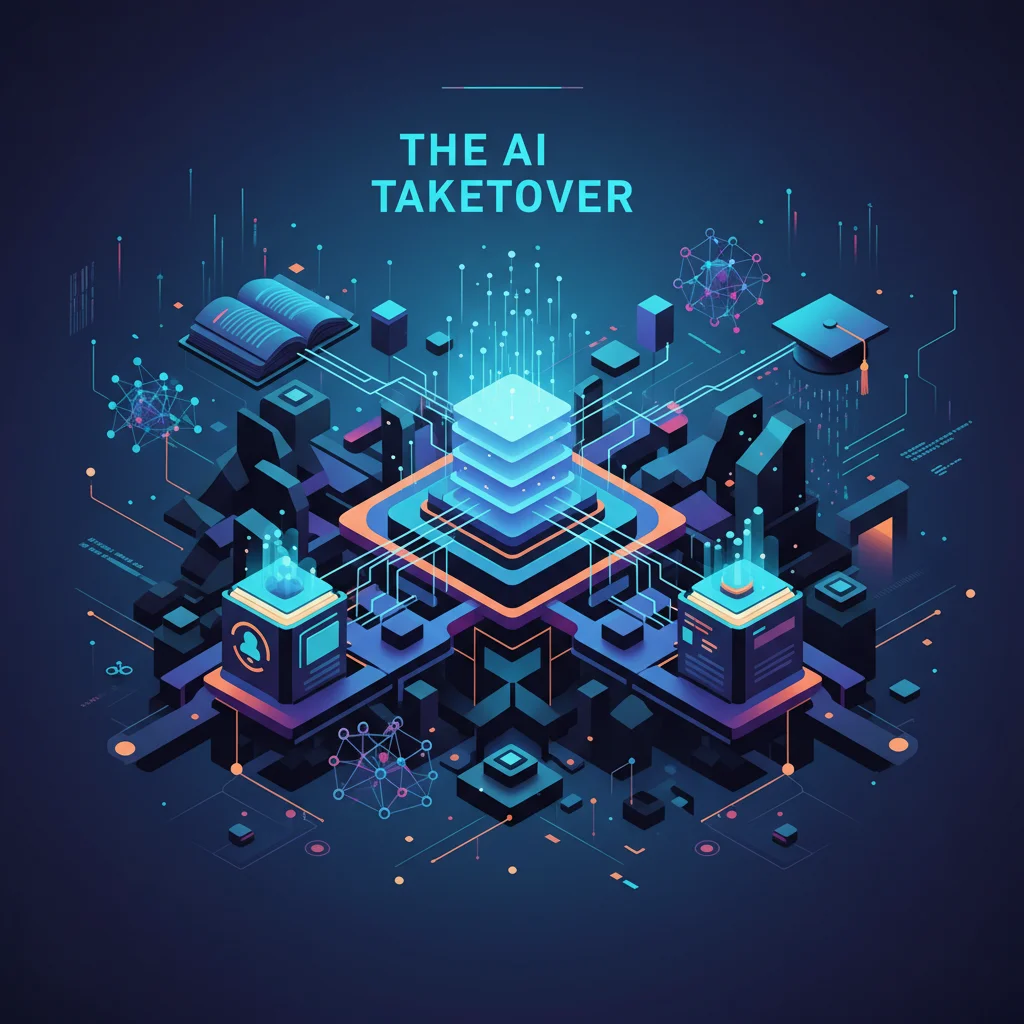
The AI Takeover: What a Secret Academic Leaderboard Reveals About Our Future
Ever wonder where the next big business trend comes from? It’s not always born in a Silicon Valley garage or a high-stakes boardroom. Often, it starts as a quiet murmur in the halls of academia, a whisper that grows into a roar. Right now, that roar is all about one thing: Artificial Intelligence.
If you want to know what CEOs, entrepreneurs, and investors will be obsessing over in the next 2-5 years, you need to look at what the brightest minds in business schools are studying today. And according to a fascinating analysis of the most-downloaded academic papers, AI isn’t just a topic of interest; it’s a complete and total takeover. It’s the academic equivalent of a blockbuster movie that sells out every single theater, leaving everything else in the dust.
A recent deep dive by the Financial Times into data from the Social Science Research Network (SSRN), a massive online library for pre-print academic papers, uncovered a stunning trend. Of the top 10 most downloaded business and management papers from the last year, a staggering nine are focused on artificial intelligence. Let that sink in. This isn’t just a trend; it’s a paradigm shift happening in real-time, signaling a fundamental rewiring of business strategy, innovation, and leadership.
The Data Doesn’t Lie: AI Is the Only Thing on the Reading List
SSRN is a crucial bellwether. It’s where researchers share their work before it’s officially peer-reviewed, making it a leading indicator of what’s currently capturing the imagination of academics, consultants, and business leaders. With over 5 million users and more than 1.3 million research papers, its “most downloaded” list is a powerful proxy for what the business world is desperate to understand.
So, what exactly are these papers that have everyone clicking “download”? It’s a fascinating mix that reveals the breadth and depth of AI’s impact. Here’s a look at the themes dominating the top of the charts, based on the FT’s analysis:
| Rank (among top 10) | Dominant Theme | Why It Matters for Business & Tech |
|---|---|---|
| 1, 2, 4, 5, 7, 8, 9, 10 | Generative AI & Large Language Models (LLMs) | This is the epicenter of the revolution. Researchers are exploring everything from the economic potential of models like GPT-4 to practical applications in science, marketing, and software development. For startups, this is a roadmap to innovation. |
| 3 | AI in Scientific Discovery | This paper highlights how machine learning can accelerate R&D, moving beyond business operations into the core of scientific innovation. Think drug discovery, materials science, and climate modeling. |
| 6 | The Broader Impact of AI | This focuses on the bigger picture: how AI is a “general-purpose technology” on par with the steam engine or electricity. It’s about systemic change, not just a new piece of software. |
The sheer dominance of generative AI is undeniable. From exploring its potential to predicting its economic impact, the academic world is racing to map out the consequences of this technology. This intense focus tells us that the questions are no longer “if” AI will change things, but “how,” “how fast,” and “what do we do about it?”
Beyond the Ticker: 3 Unlikely Case Studies on Tech Innovation & Market Trends
Why This Academic Obsession Is a Five-Alarm Fire for Your Career and Business
It’s easy to dismiss this as “ivory tower” stuff, but that would be a massive mistake. This academic groundswell is the canary in the coal mine for several critical shifts:
1. The End of Business as Usual
For decades, business strategy was about Porter’s Five Forces, SWOT analysis, and Blue Ocean Strategy. Now, the most urgent strategic questions revolve around data, automation, and algorithms. How do you build a competitive moat when an AI-powered competitor can replicate your core business logic in months? How do you manage a workforce that’s a hybrid of humans and intelligent agents? These are the questions keeping CEOs up at night, and they’re turning to this new wave of research for answers.
2. The Rise of the Tech-Fluent Leader
You no longer have the luxury of saying, “I’m not a tech person.” The modern leader, whether at a Fortune 500 company or a two-person startup, must have a deep, intuitive understanding of concepts like machine learning, cloud infrastructure, and even the basics of programming logic. This research isn’t just for the CTO; it’s required reading for the entire C-suite. The demand for leaders who can bridge the gap between business strategy and AI implementation is exploding.
3. A Blueprint for Innovation and Investment
For entrepreneurs and developers, this list is a treasure map. It points directly to the areas ripe for disruption. A paper on AI in scientific discovery could spark a new SaaS platform for biotech labs. Research on the economic impact of LLMs can provide the data needed to justify a VC pitch. This academic work is effectively de-risking and validating entire categories of new businesses, providing a solid foundation for commercial innovation.
What This Means for You: Actionable Insights for Every Professional
Okay, so AI is dominating the academic charts. Cool story. But what should you actually *do* about it? Here’s a breakdown for different roles:
For Developers and Tech Professionals:
Your skills are in the driver’s seat of this revolution. This research validates the importance of staying on the cutting edge.
- Go Beyond the Code: Don’t just learn a new framework; read these papers to understand the business *context* of the software you’re building. Knowing *why* a certain machine learning model can create a competitive advantage will make you an invaluable strategic partner, not just a coder.
- Focus on MLOps and Cloud Architecture: The most brilliant AI model is useless if it can’t be deployed, scaled, and maintained. The demand for professionals who understand how to build robust, secure, and scalable AI infrastructure on the cloud is skyrocketing.
- Anticipate the Next Challenge: As AI becomes more prevalent, so will the attack vectors. Specializing in AI-specific cybersecurity—like protecting models from data poisoning or adversarial attacks—is a massive future-proof career move.
Your Snack Could Get You Arrested: When AI-Powered Security Goes Terribly Wrong
For Entrepreneurs and Startup Founders:
This is your market research, served on a silver platter.
- Solve a “Second-Order” Problem: The race to build the next foundational model is crowded. Instead, use this research to find “second-order” problems. For example, if AI is transforming scientific research, what SaaS tools do those new AI-powered labs need? Think about building the “picks and shovels” for the AI gold rush.
- Build Your Pitch Deck on Data: When you’re pitching investors, citing a top-downloaded paper from a leading business school adds immense credibility. It shows you’re not just chasing a trend; you’re building on a validated, academically-backed foundation. According to the research, the market for AI-driven automation is set to grow exponentially (source).
- Think “AI-Native,” Not “AI-Added”: Don’t just bolt an AI feature onto an existing product. Use these papers as inspiration to build a business that is fundamentally AI-native, where machine learning is the core of your value proposition, not a feature.
The AI Glitch That Saw a Gun: Why a Teen's Doritos Snack Is a Wake-Up Call for All of Tech
The Final Word: The Ivory Tower Is Now a Launchpad
The days of business research being a dry, theoretical exercise are over. The world’s top business schools have become real-time R&D labs for the AI revolution. The data from SSRN is a clear, unambiguous signal: the future of business, strategy, and innovation is inextricably linked to the development and deployment of artificial intelligence.
This isn’t just about a few popular papers. It’s about a fundamental reorientation of our entire economy around a new, powerful technology. Ignoring this shift is like trying to run a shipping business in the 20th century while ignoring the invention of the container ship. You can do it for a while, but you won’t last long. The question is no longer whether you should pay attention to AI, but whether you can afford not to.


